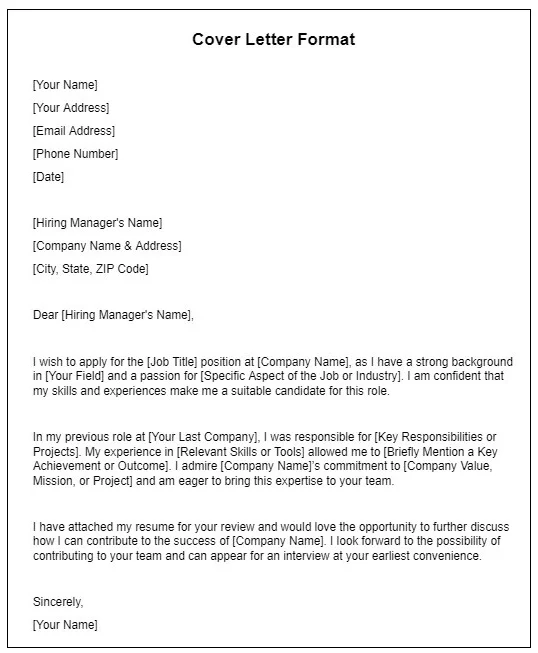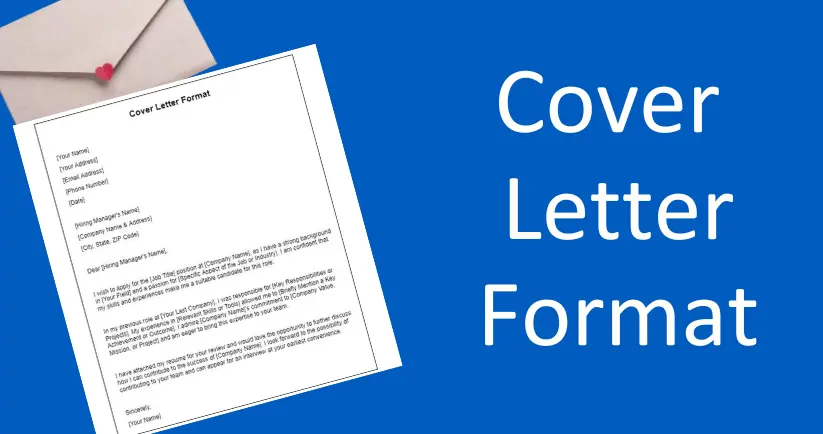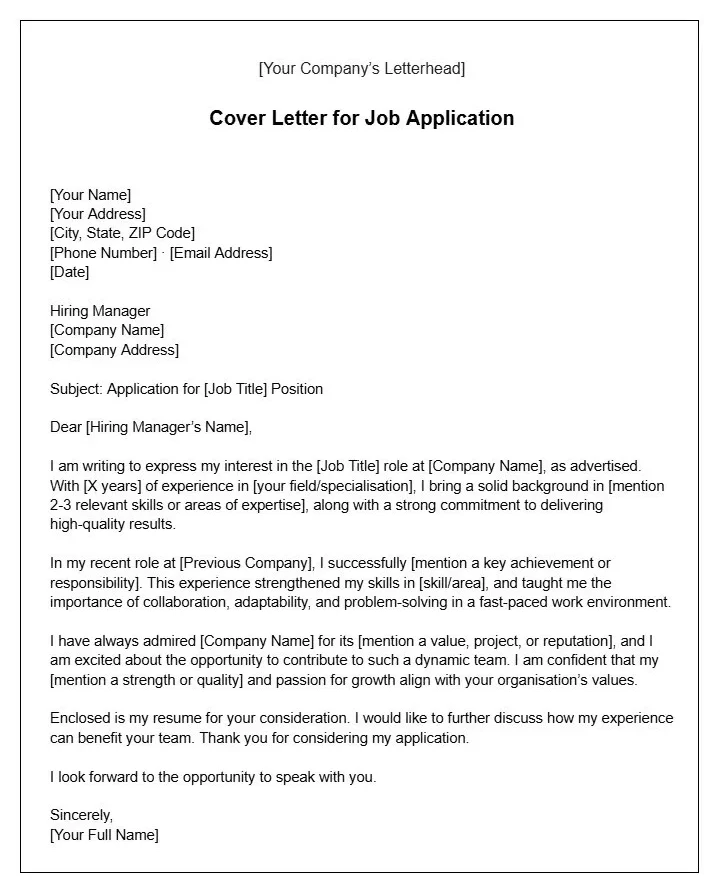In your pursuit of getting the best job available, you need to put your best foot forward. A cover letter helps you create that amazing first impression as your recruiter will go through your cover letter before deciding to check your resume. Hence, a good cover letter format at hand can be the difference between you getting your dream job, or you being rejected.
As with any other letters such as the relieving letter, the cover letter for a job application should be written by keeping the intent in mind, ensuring that you understand the job requirements and what they recruiter is looking for.
So, we will be explaining what a cover letter and its importance is, how to write it, and when to send it with this blog.
What is a Cover Letter?
A cover letter is a letter sent along with a job application as a personal introduction. Your cover letter explains why you are the right candidate for the vacant position.
You would have written a resignation letter in your previous company to notify your HR that you want to leave the job. Similarly, a cover letter for a job notifies the recruiter that you are interested in the position.
It is used to express your interest in the job and highlight your related skills and experience to convince the hiring manager to take your resume to the next stage within their recruitment management system.
Cover Letter for Job Application
Cover Letter
[Your Name]
[Your Address]
[Email Address]
[Phone Number]
[Date]
[Hiring Manager’s Name]
[Company Name & Address]
[City, State, ZIP Code]
Dear [Hiring Manager’s Name],
I am mailing you as I am interested in the [Job Title] position at [Company Name], as advertised on [Where You Found the Job Posting]. With [X] years of experience in [Your Field or Industry], I am confident that I will be an asset to your team and organization.
In my current role at [Your Current or Previous Company], I have honed my skills in [Key Skills or Responsibilities Relevant to the Job]. I have a proven track record of [Briefly Mention an Achievement or Accomplishment]. My ability to [Key Strength or Attribute] has consistently contributed to [Result or Outcome], and I am eager to bring this dedication to [Company Name].
What excites me most about this opportunity is [Mention a Specific Aspect of the Company or Role that Interests You]. I am particularly drawn to [Company Name] because of [Company’s Reputation, Values, or Specific Projects], and I believe my background in [Your Field] aligns well with your current goals.
I am enthusiastic about the opportunity to contribute to your team and am confident that my skills and experiences will allow me to make a meaningful impact. I have attached my resume for your review and would welcome the chance to discuss how I can contribute to [Company Name] in more detail.
Thank you for considering my application. I look forward to the possibility of contributing to your team and am available at your earliest convenience for an interview.
Sincerely,
[Your Name]
Cover Letter Sample for Job Application in Word Format
We are sharing a cover letter sample for job application – a Word file, which will help you understand how to write a short cover letter sample for a job application easily:
Cover Letter Format in Word
We are sharing a cover letter format – word file, which will help you understand how to write short cover letter sample:

Cover Letter Templates
We are also sharing a few cover letter templates to help you understand how to write cover letters for specific scenarios:
1. Cover Letter for Internship
Cover Letter
[Your Name]
[Your Address]
[Email Address]
[Phone Number]
[Date]
[Hiring Manager’s Name]
[Company Name & Address]
[City, State, ZIP Code]
Dear [Hiring Manager’s Name],
I am mailing to let you know of my interest in the [Specific Internship Title] at [Company Name], as advertised on [Where You Found the Internship Posting].
As a [Your Major] student at [Your University], I have developed a strong foundation in [Relevant Skills or Subjects], and I am eager to apply my knowledge and gain practical experience at your esteemed organization.
During my academic career, I have undertaken projects and coursework that have equipped me with [Specific Skills Relevant to the Internship]. For instance, [Briefly Mention a Project or Course] allowed me to develop skills in [Skill 1, Skill 2, etc.], which I believe will be valuable in this internship.
What excites me about this internship opportunity is [Mention Something Specific About the Internship or Company]. I am particularly impressed by [Company Name]’s commitment to [Company Value, Mission, or Specific Project], and I am eager to contribute my enthusiasm and fresh perspective to your team.
Although I am still in the early stages of my career, I am highly motivated, quick to learn, and ready to contribute meaningfully to your organization. I am confident that this internship will not only allow me to grow professionally but also enable me to bring value to [Company Name].
I have attached my resume for your review and would welcome the opportunity to discuss how my skills and experiences align with the goals of your internship program. Thank you for considering my application. I look forward to the possibility of contributing to your team.
Sincerely,
[Your Name]
2. Cover Letter for Fresher
Cover Letter
[Your Name]
[Your Address]
[Email Address]
[Phone Number]
[Date]
[Hiring Manager’s Name]
[Company Name & Address]
[City, State, ZIP Code]
Dear [Hiring Manager’s Name],
I am mailing you to let you know of my interest in the [Job Title] position at [Company Name], as advertised on [Where You Found the Job Posting]. As a recent graduate with a [Your Degree] from [Your University], I am eager to apply my academic knowledge and skills in a professional setting and contribute to your esteemed organization.
During my time at [Your University], I developed a solid foundation in [Relevant Subjects or Skills]. My coursework and projects, such as [Briefly Mention a Relevant Project or Thesis], have equipped me with [Specific Skills or Experiences Relevant to the Job]. For example, in my [Project Name or Course], I [Describe What You Did and the Skills You Gained], which I believe will be valuable in the [Job Title] role.
In addition to my academic achievements, I have also gained practical experience through [Professional Activities]. At [Previous Internship or Job], I [Describe Your Role and Achievements]. This experience taught me [Key Learnings or Skills], which I am excited to bring to [Company Name].
I am particularly drawn to [Company Name] because of [Specific Reason Related to the Company]. I admire [Mention Something Specific About the Company’s Work or Culture], and I am enthusiastic about the opportunity to contribute to [Specific Aspect of the Company or Team].
I have attached my resume for your review and would welcome the opportunity to discuss how my background, skills, and enthusiasm can contribute to the success of [Company Name]. Thank you for considering my application. I look forward to the possibility of contributing to your team and am available at your earliest convenience for an interview.
Sincerely,
[Your Name]
How to Write a Cover Letter?
Writing a cover letter is a simple task if you understand the motive and components of cover letters. In a digital age where HR chatbot is used to communicate with candidates, a cover letter gives your resume added value. Irrespective of the stage you are at in your career, a cover letter can help you make a lasting impression.
Here is a simple guide for you to write an effective cover letter:
1. Research about Company
In the digital age, possessing the right skillset is not enough. You should also be aligned with the values of the organization. Hence, the first step is to research about the company, its culture, and organizational values in addition to the roles and responsibilities that you have to carry in the position.
2. Mention the Purpose
Once you have researched the company well, you can start with writing the letter. You should begin by answering the question, ‘what is the purpose of this cover letter?’ The letter should introduce your resume and highlight your most suitable skills and experience. You should give a personalised touch to your resume and make it the right fit for the role.
3. Format Letter Properly
Keep in mind that the cover letter should follow a professional business letter format. In addition to that, it’s best if you address your cover letter to a specific person such as the hiring manager, or the team manager. The letter should be completed in a single page using a legible font and minimal colours.
4. Start with a Strong Opening
Similarly, you should grab the attention of the recruiter with a compelling opening for your letter. Focus on why you are excited about the position, and what makes you suitable and mention any mutual contacts if required.
5. Showcase Your Personality
A cover letter is about adding something more to your application than what is mentioned in your resume. Hence, use this opportunity to explain how you add value to the organization as a staff member. Since a ‘job’ is about how you can help and inspire others to do more and be part of a healthy environment, you need to talk about your personal traits in your job application.
6. Address Potential Concerns
Applying for the job you want can be daunting when you have concerns such as gaps in employment or education. A good cover letter gives you an opportunity to present your side of story, justifying these gaps. Writing a cover letter helps you ensure that you get a chance for the next round of the hiring process as the letter helps you explain your resume.
7. Close Strongly
End the cover letter with powerful closing that expresses gratitude yet makes you memorable as a candidate. You can even request an opportunity for the next stage of the recruitment process. Hence, you should check the spellings, grammar, and overall formatting before sending your application.
Which Cover Letter to Send?
Cover letters are a great tool to grab the attention and convince the employer to hire you. There are different types of cover letters and to stand out in a heap of letters, you need to choose the right one.
Below are different kinds of cover letters that you should keep in mind while writing your cover letter:
➔ The Standard Cover Letter
A standard cover letter is a traditional format of the cover letter that is widely accepted and can be used for all jobs. While writing a cover letter as a boosting tool for your job application, you can include an introduction, body, and conclusion that can convey your experience, skills and enthusiasm for the job role.
➔ The Networking Cover Letter
The networking cover letter is used when you have been referred for the job opportunity by a mutual connection. For this letter, it’s essential to start with the mention of the mutual connection. It helps you establish credibility instantly and you can jump in to explain how you find yourself best for the opportunity based on the information you gathered about the job role from the common connection. It informs the recruiter that you are well aware of the job role and its daily responsibilities.
➔ The Prospecting Cover Letter
When you are interested in working for a company but the job opening that you are looking for has not been published yet, you should go for a prospecting cover letter. With this cover letter, you can express your ambition to work for the company and how your values align with the mission and vision of the company. Then, you need to emphasize the value that you will bring to the organization with the skills and experience you possess.
➔ The Application Cover Letter
The application cover letter is one that you send when applying for the job from the online portal or emails. With this type of cover letter, it’s crucial to keep it crisp and tailor it according to the job description that you are responding to. The cover letter should be customized for the job responsibilities and have a balanced use of keywords so you can get through the Applicant Tracking System (ATS).
➔ The Career Change Cover Letter
Many people feel the need to switch the stream of their career at a certain point. In such a situation, when you are applying for a new position, you need to write a career change letter that explains the reasons for the change as well as your passion for the new field. You can refer your termination letter that you wrote to your previous organization to recollect the points mentioned as the reason for career change. This cover letter should further highlight the relevant skills you possess. Ensure that you emphasize how your varied background adds value and makes you efficient for the new role.
➔ The Creative Cover Letter
You can use some creative cover letters if you are applying for a position in a creative field such as marketing or design. The cover letter should not just talk about the skills but also highlight your creativity with the visual format. You can get creative here while maintaining professionalism by focussing on showcasing the areas that the job role requires.
➔ The Thank You Cover Letter
The cover letter that expresses your gratitude after the interview is a great tool to showcase your interest in the position as well as briefly talk about why you are the right person for the job. It keeps you on top of the hiring manager’s mind, improving your chances for selection.
What is ideally included in a Good Cover Letter?
As you’re applying for a job, the cover letter should be in a standard business format, and the following components must be included in it:
- Header – The header should include name, address, phone number, email and the date.
- Salutation – Address your cover letter to the hiring manager or the recruiter. Use their names if possible as it gives more personal touch.
- Introduction – Start the letter by mentioning the position you’re applying for, how you came across the opening, and expressing your enthusiasm for the role.
- The Body – The paragraphs in your cover letters should talk about all factors that makes you the most suitable candidate for the job. You can customize the content for specific requirements of the employer.
- Closure – Thank the employer for the opportunity and express your hope to get a positive response from the organization to move further in the screening process.
- Signature – Maintain professional structure of your cover letters by adding your signature. While its accepted to type your name in case of emails, you should include a handwritten signature if you are sending a hard copy.
Conclusion
Writing a cover letter is easy but writing an effective cover letter isn’t. That is why we have shared the cover letter templates with you, along with what you should include in it. Feel free to download the cover letter format we have shared as well as edit it according to your requirements.
FAQs on Cover Letter
1. Should I write a unique Cover Letter for each job application?
It’s highly recommended to tailor your cover letters for every job. It seems easy to write a generic cover letter and send it with every job application. However, it’s important to customize it for specific needs of the job roles and organization explaining how your skills and experience make you a perfect fit. A well written cover letter exponentially increases the value of your job application as it helps you to stand out among the crowd.
2. What is an ideal length of a Cover Letter?
Ideally, the length of your cover letter should not exceed one page. Your cover letter is your short pitch to convince the hiring manager to consider your resume for a role you’re applying for. The recruiters often have limited time on their hands, and anything more than a page may act against your job application instead of supporting it.
3. Do I need to include references in my Cover Letter?
You don’t need to write a cover letter for every job but when you think that you need more than your resume and you want to explain something, you can include references. Your cover letter should be on demand from the employer so that it will be more acceptable. If you want to highlight a particularly impressive reference, a cover letter can help you do that.










